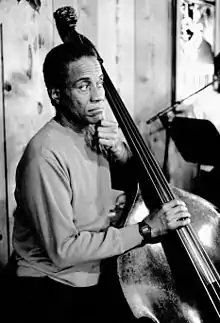Richard Davis | |
|---|---|
 Davis performing in 1987 | |
| Background information | |
| Born | April 15, 1930 Chicago, Illinois, U.S. |
| Died | September 6, 2023 (aged 93) Madison, Wisconsin, U.S. |
| Genres | Jazz, pop, classical |
| Occupation(s) | Musician, educator |
| Instrument(s) | Double bass |
| Labels | Muse, Palmetto, Marge |
| Website | www |
Richard Davis (April 15, 1930 – September 6, 2023) was an American jazz bassist. Among his best-known contributions to the albums of others are Eric Dolphy's Out to Lunch!, Andrew Hill's Point of Departure, and Van Morrison's Astral Weeks, of which critic Greil Marcus wrote (in The Rolling Stone Illustrated History of Rock and Roll), "Richard Davis provided the greatest bass ever heard on a rock album."[1]
Biography
Born on April 15, 1930 in Chicago, Illinois,[2] Davis began his musical career with his brothers, singing bass in his family's vocal trio.[3] He studied double bass in high school with his music theory teacher and band director, Walter Dyett. He was a member of Chicago Youth Symphony Orchestras (then known as the Youth Orchestra of Greater Chicago) and played in the orchestra's first performance at Chicago's Orchestra Hall on November 14, 1947. After high school, he studied double bass with Rudolf Fahsbender of the Chicago Symphony Orchestra while attending VanderCook College of Music.
After college, Davis performed in dance bands. The connections he made led him to pianist Don Shirley.[2] In 1954, he and Shirley moved to New York City and performed together until 1956,[2] when Davis began playing with the Sauter-Finegan Orchestra. In 1957, he became part of Sarah Vaughan's rhythm section, touring and recording with her until 1960.[2]
During the 1960s, Davis was in demand in a variety of musical circles. He worked with many of the small jazz groups of the time, including those led by Eric Dolphy, Jaki Byard, Booker Ervin, Andrew Hill, Elvin Jones, and Cal Tjader.[2] From 1966 to 1972, he was a member of The Thad Jones/Mel Lewis Orchestra.[2] He has also played with Don Sebesky, Oliver Nelson, Frank Sinatra, Miles Davis, Dexter Gordon, Joe Henderson and Ahmad Jamal.[4]
Davis recorded with pop and rock musicians in the 1970s, appearing on Laura Nyro's Smile, Van Morrison's Astral Weeks (for which Davis also served as de facto bandleader during the recording sessions[5]), and Bruce Springsteen's Greetings From Asbury Park, N.J. and Born to Run. During his career he performed classical music with conductors Igor Stravinsky, Leonard Bernstein, Pierre Boulez, Leopold Stokowski, and Gunther Schuller.[4]
After living in New York City for 23 years, he moved to Wisconsin in 1977 and became a professor at the University of Wisconsin–Madison,[2] teaching bass, jazz history, and improvisation. His former students include William Parker, David Ephross, Sandor Ostlund, Hans Sturm, Alex Kalfayan, Ryan Maxwell and Karl E. H. Seigfried.[6]
Richard Davis died on September 6, 2023, after two years in hospice care. He was 93.[7]
Grammy-winning music producer, Ian Brennan (music producer), wrote an obituary for Davis in Tape Op Magazine noting how his bass playing was the first and last thing heard on Astral Weeks, propelling the entire album.[8]
Awards and honors
- Best Bassist, Downbeat International Critics' Poll (1967–74)
- NEA Jazz Master (2014)[9]
Discography
- Heavy Sounds (Impulse!, 1967) with Elvin Jones
- Muses for Richard Davis (MPS, 1969)
- The Philosophy of the Spiritual (Cobblestone, 1971)
- Epistrophy & Now's the Time (Muse, 1972)
- Dealin' (Muse, 1973)
- As One (Muse, 1976)
- Fancy Free (Galaxy, 1977)
- Divine Gemini (SteepleChase, 1978) with Walt Dickerson
- Harvest (Muse, 1977 [1979])
- Way Out West (Muse, 1977 [1980])
- Tenderness (SteepleChase, 1977 [1985]) with Walt Dickerson
- Persia My Dear (DIW, 1987)
- Body and Soul (Enja, 1989 [1991]) with Archie Shepp
- The Bassist: Homage to Diversity (Palmetto, 2001)
References
- ↑ Marcus, Greil. The Rolling Stone Illustrated History of Rock and Roll.
- 1 2 3 4 5 6 7 Colin Larkin, ed. (1992). The Guinness Who's Who of Jazz (First ed.). Guinness Publishing. p. 115. ISBN 0-85112-580-8.
- ↑ Ron Wynn. "Richard Davis | Biography". AllMusic. Retrieved 2015-09-04.
- 1 2 "Richard Davis". Richarddavis.org. Retrieved 9 October 2016.
- ↑ Heylin, Clinton (2003). Can You Feel the Silence? Van Morrison: A New Biography, Chicago Review Press, ISBN 1-55652-542-7
- ↑ "The University of Wisconsin-Madison School of Music | Richard Davis". Music.wisc.edu. 2014-07-14. Retrieved 2015-09-04.
- ↑ Chappell, Robert (September 7, 2023). "Richard Davis, international jazz legend and champion of racial justice, dies at 93". Madison365. Retrieved September 7, 2023.
- ↑ https://tapeop.com/interviews/158/remembering-richard-davis/
- ↑ "NEA Jazz Masters: Richard Davis". National Endowment for the Arts. Archived from the original on July 6, 2013. Retrieved June 27, 2013.
External links
- Official site
- Richard Davis at IMDb
- Richard Davis discography at Discogs